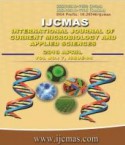


 National Academy of Agricultural Sciences (NAAS)
National Academy of Agricultural Sciences (NAAS)

|
PRINT ISSN : 2319-7692
Online ISSN : 2319-7706 Issues : 12 per year Publisher : Excellent Publishers Email : editorijcmas@gmail.com / submit@ijcmas.com Editor-in-chief: Dr.M.Prakash Index Copernicus ICV 2018: 95.39 NAAS RATING 2020: 5.38 |
Crop production and livestock both are most important aspects of agriculture. Because in farming systems based on mixed crop livestock the waste or by product of one system is used as input to second system. Soil-fertility depletion in smallholder farms is the main biophysical process explaining the impact of climate change on decline in per capita food production. At farm scale, however, it becomes evident that the set of processes leading to soil- fertility depletion is not homogeneously distributed in space. Variability in soil fertility arises from differences in underlying geology and geo-morphology, and due to a number of mechanisms within the farming systems (i.e. farm management practices). Farmers manage several organic and mineral resources in order to attain their production goals. The net flow of resources is not equal for the various fields belonging to a single farm household but varies substantially, creating areas with carbon and nutrient accumulation and depletion. Some of the nutrient flows and transfers involved vary strongly between farmers of differing social status, notably between cattle owners and non-cattle owners. A differential long-term management of the different fields of a farm adds an important source of variability, creating zones of soil fertility due to concentration of agricultural produce and organic wastes around the homesteads under changing climate.
 |
 |
 |
 |
 |